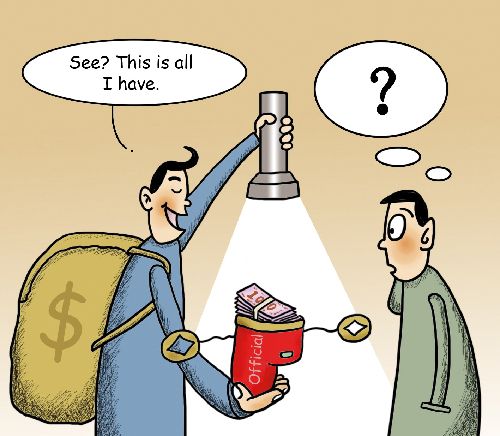|

The information made public includes the officials' annual salaries, subsidies and other income from activities such as giving lectures and authoring books related to their work. Valuable gifts from job-related organizations or individuals given to them or other family members should all be made public. Income from stock holdings, inheritance and lotteries, as well as any fixed assets of more than 100,000 yuan ($15,822) are still restricted from public view.
On January 1, 2009, the incomes of 55 newly appointed officials in Altay were posted online. By March 2009, more than 1,000 officials' incomes had been publicized.
Altay's move was followed by quite a few other cities including Cixi in eastern Zhejiang Province, Liuyang in central Hunan Province and Qingtongxia in the northwestern Ningxia Hui Autonomous Region.
Monitoring system
Zhang Qiuyue, Director of the CPC Commission for Discipline Inspection of Jiawang District, Xuzhou in Jiangsu Province, revealed that among the more than 600 officials declaring assets, only four admitted to having more than one apartment and the rest all said that they have only one apartment and no investment.
But the public is skeptical of the information. "I think some officials conceal their assets. The declaration system will have a credibility crisis if the information uploaded is untrue," said Hou Changdong, a resident in Jiawang, who said that some officials allegedly have more than one apartment.
"The officials' declarations were not verified before they were put on the Internet," Zhang said. He pledged that those who conceal their assets will be punished according to Party discipline after being reported and verified.
"The lack of a developed credit system is a major obstacle to the establishment of officials' property declaration system," said Li Yongzhong, Vice President of the Chinese Academy of Disciplinary Inspection and Supervision, which is run by the Central Commission for Discipline Inspection (CCDI) of the CPC, the Party's top anti-graft body. "All the pilot programs were initiated by local governments. That will mean less supervisory power."
On March 26, Premier Wen Jiabao expressed his determination to publicize assets of officials at the State Council's annual conference on anti-corruption work.
"Corruption tends to occur frequently in departments that possess great power and in areas where the management of funds is centralized. Corruption cases involving state-owned enterprises and high-level officials are still serious," Wen said.
Wen called for tighter supervision and discipline of officials, especially those whose spouses and children have gone to live overseas. Besides, he said that the money spent on overseas trips, receptions and vehicle purchases and maintenance by government officials should also be strictly scrutinized.
"Public funds should never be used to buy cigarettes, high-end wines or gifts. The use of government vehicles and construction of government office buildings should also be strictly managed. Luxurious buildings or decorations will be prohibited. The number of ceremonies, forums and conferences should be controlled," Wen said.
In 2010, the CCDI released a regulation requiring top-level officials to submit reports of their property assets and investment activities as well as the jobs of their spouses and children to disciplinary bodies. However, the authorities have decided not to release the information to the public.
Han Deyun, a Chongqing-based lawyer and NPC deputy, has submitted motions at NPC annual full sessions for seven consecutive years, proposing legislation that would require government officials to disclose their assets and show how they earned them.
"At the bottom level, arousing enthusiasm among the public is also necessary, in a bid to ensure appropriate supervision for the launch and implementation of the system," Han said.
|